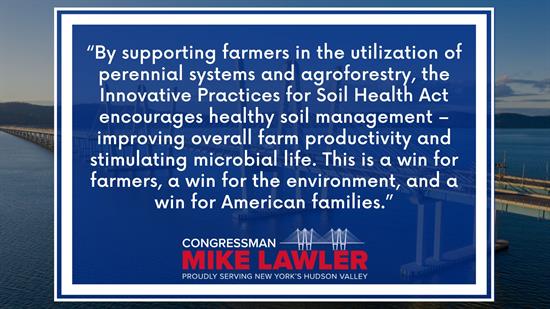Press Releases
LAWLER, BEYER, AND PINGREE INTRODUCE BIPARTISAN LEGISLATION TO IMPROVE SOIL HEALTH AND SUSTAINABILITY ON FARMS
Washington, DC,
January 26, 2024
Yesterday, U.S. Representatives Mike Lawler (R-NY), Don Beyer (D-VA), and Chellie Pingree (D-ME) introduced the Innovative Practices for Soil Health Act, bipartisan legislation to improve soil health on farms and support sustainable alternatives to annual agriculture by improving United States Department of Agriculture (USDA) conservation programs to ensure they are better able to support farmers who incorporate perennial systems and agroforestry into their operations. “By supporting farmers in the utilization of perennial systems and agroforestry, the Innovative Practices for Soil Health Act encourages healthy soil management – improving overall farm productivity and stimulating microbial life,” said Rep. Lawler. “This is a win for farmers, a win for the environment, and a win for American families. I’m proud to join my colleagues Don Beyer and Chellie Pingree in introducing this commonsense bipartisan bill.” “American agriculture faces many challenges today, including harmful soil erosion exacerbated by the climate crisis’ extreme weather patterns,” said Rep. Beyer. “Our bill is a significant step to support the health and sustainability of American farms by ensuring the USDA has the resources necessary to be a strong partner for farmers who prioritize perennial agriculture and agroforestry. These practices promote soil health, which not only makes the soil more resilient to extreme weather events and erosion but also improves long-term agricultural productivity and farming’s impacts on watersheds and wildlife.” “In Maine and across the country, farmers are on the frontlines of the climate crisis – dealing with severe drought, flooding, wildfires, and other extreme weather conditions,” said Rep. Pingree. “In order to make our food system more resilient and to ensure our agricultural producers survive the worsening climate crisis, we must encourage and invest in climate-smart practices. My and Representatives Beyer and Lawler’s Innovative Practices for Soil Health Act does just that – promoting soil health, investing in agroforestry research and development, and incentivizing greenhouse gas reduction. Our bipartisan, commonsense bill is a win-win.” "The Innovative Practices for Soil Health Act provides common-sense, straight-forward support for high-impact perennial practices through NRCS conservation programs. It also ensures increased technical capacity at USDA for new and exciting perennial practices through a series of agroforestry centers,” said National Sustainable Agriculture Coalition Conservation Specialist Jesse Womack. “This bill is a win for farmers committed to building soil health across their operation through plant diversity and strong, living roots.” "We applaud Representatives Beyer, Lawler, and Pingree for introducing the Innovative Practices for Soil Health Act of 2024. This bill could unlock critical incentives for farmers and ranchers to implement carbon-storing practices like agroforestry and perennial systems,” said Carbon180 Deputy Director of Policy Cristel Zoebisch. “By making targeted changes to federal conservation programs and expanding technical assistance for innovative, climate-friendly production systems, this bill would equip producers with the tools they need to activate their soils as carbon sinks and bolster resilience to weather extremes.” Annual crops and monoculture cropping, common in farming, require tilling which disrupts the natural soil structure and can lead to increased erosion and a reliance on harmful fertilizers and pesticides. Perennial and agroforestry systems require less soil disturbance – improving soil structure, preventing erosion, increasing ecosystem nutrient retention, and promoting carbon sequestration. Successfully designing, installing, and maintaining perennial systems and agroforestry on farms, however, is a long and complex process that comes with real costs. The Innovative Practices for Soil Health Act would support these farmers by improving USDA Natural Resource Conservation Service (NRCS) programs, the Conservation Stewardship Program (CSP) and Environmental Quality Incentives Program (EQIP); increasing technical assistance for farmers installing perennial systems; and designating four national and regional agroforestry centers. New York's 17th Congressional District is just north of New York City and contains all or parts of Rockland, Putnam, Dutchess, and Westchester Counties. |




